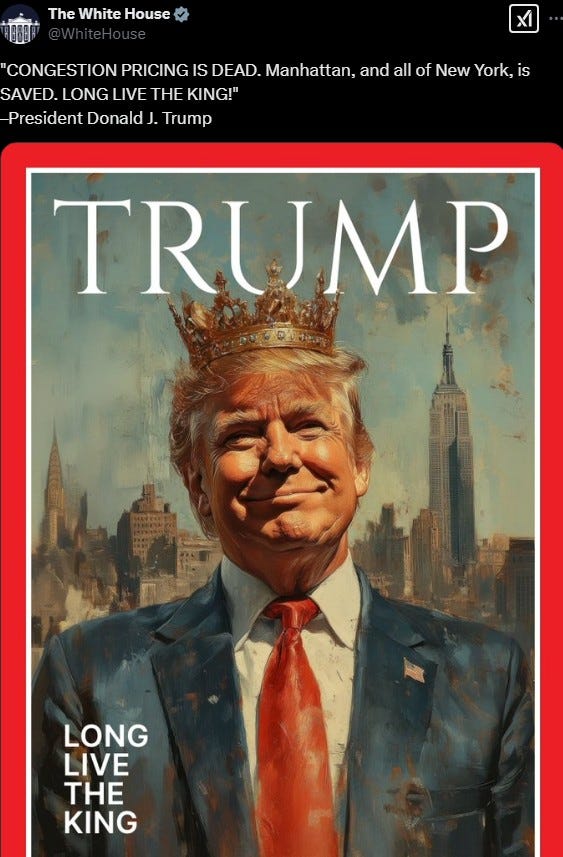Power dynamics of ultra-personalised leadership styles
Presidential neo-feudalism makes a comeback
The past few weeks have been hectic in world politics.
Lenin, of all people, famously said:
“There are decades where nothing happens; and there are weeks where decades happen”
And this feels all-too-true at this moment.
The instabilities we are confronting are coming primarily from political systems where power is concentrated hugely in the hands of a single person - presidential-style systems, where a single identifiable individual is both head of government and head of state all in one constitutional package (almost like an elected king).
This can be an unstable but potent form of governance, where power emanates from loyalty to a central polarising figure. The administration functions like a royal court, dominated by courtiers prioritising allegiance and proximity to the leader over merit or competence.
One way of trying to understand what is going in these regimes is through the lens of political science and history: there’s a huge literature on the perils of presidentialism, and the instabilities that are a design feature of presidential systems (as opposed to parliamentary systems, where power is more dispersed, disposing of leaders is generally easier, and party systems are generally stronger and not dependent on the whims of the leader).
It’s also very easy to try and focus on ‘personality’ as a good way to predict what is likely to happen next in such a personalised presidential regime or administration.
There are other lenses we can use, however. I explore here (through a psych/neuro lens) highly-personalised presidential leadership systems where power is concentrated around a single dominant leader, creating dynamics reminiscent of an old-fashioned monarchical court. Understanding these power patterns requires a psychological lens: how myths, symbols, and loyalty networks shape not just societal structures but individual and collective behavior within them.
Topics below:
Leadership Through a Psych/Neuro Lens
Forget Focusing on Personality
Social and Psychological Mechanisms of Control
Cognitive Biases are Amplified
A Court of Loyalty and Fear: Groupthink and Conformity; Social Identity; Moral Disengagement; Power Struggles Between Courtiers
Courtier Politics are Fragile and Unstable
Decline and Collapse
Watch Out For: Heightened Paranoia; Revenge as Legacy: Age-related Cognitive Decline
Nothing Lasts Forever
Leadership Through a New Lens
By analysing personalised power systems through the lens of psychology and neuroscience, we can try understand how our human cognitive tendencies—such as the desire for affiliation, the fear of exclusion, and the reinforcement of in-group loyalty—shapes political decision-making and courtier behaviour more generally.
Leadership is not just about taking decisions and policies, for leadership itself is also deeply-rooted in the cultural and psychological fabric of societies. In traditional societies, leadership often operates via personalised power, akin to the dynamics of chiefdoms or patronage systems, where loyalty to a central figure eclipses institutional checks.
This kind of personalised power sustains itself through mythmaking and symbolism—rituals and narratives elevating the leader to an almost sanctified status, reinforcing their dominance over all, with thanks demanded from all.
Dominance displays have a cost: formal institutions erode under neo-feudal loyalty tests, and these institutions of state increasingly morph into tools for the leader’s will and whims.
To survive, today’s courtiers trade loyalty to the leader in return for protection and resources provided by the ‘boss’. This form of loyalty subverts bureaucratic and legal norms, shifting the balance firmly to personal rule.
Forget Focusing on the Leader’s Personality for a While…
We should focus more on the cognitive and social mechanisms shaping leadership, loyalty, and decision-making within a tightly-knit, higly-personalised, power structure. The stability and durability of the leader’s power hinges both on the degree of their psychological entrenchment in their followers and their cultural legitimacy in the nation.
This highly personalised system of leadership rule does not function like traditional bureaucratic government institutions focused on formal governance and management.
Instead, it operates as a complex network of courtiers embedded within the government, holding their positions because they are true believers who willingly abase themselves before their leader. It is most certainly not a ‘team of rivals’, with the leader merely first among equals.
These individual courtiers hold official positions, appointed by the president or leader, yet their true roles centre on maintaining proximity to and influence over the central figure of the administration.
This leadership styles fosters a highly asymmetrical distribution of power, where the dynamic between the leader and their courtiers is characterised by dependency, loyalty tests, and a culture of sycophancy. The leader's need for adulation and their tendency to eliminate dissenting voices results in an echo chamber reinforcing and supporting their worldview - in other words, an information system driven by confirmation bias.






